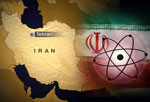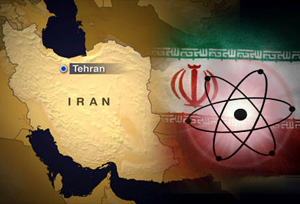 Reuters: Expanding uranium enrichment, a new atomic energy chief said to have military expertise, missile tests — Western analysts see fresh signs that Iran may be seeking to develop the means to build nuclear warheads.
Reuters: Expanding uranium enrichment, a new atomic energy chief said to have military expertise, missile tests — Western analysts see fresh signs that Iran may be seeking to develop the means to build nuclear warheads.
By Fredrik Dahl
 VIENNA, July 6 (Reuters) – Expanding uranium enrichment, a new atomic energy chief said to have military expertise, missile tests — Western analysts see fresh signs that Iran may be seeking to develop the means to build nuclear warheads.
VIENNA, July 6 (Reuters) – Expanding uranium enrichment, a new atomic energy chief said to have military expertise, missile tests — Western analysts see fresh signs that Iran may be seeking to develop the means to build nuclear warheads.
Iran’s determination to press ahead with a nuclear programme it says is for purely peaceful purposes suggests that tougher Western sanctions are so far failing to force the Islamic state to back down in the long-running dispute over its atomic aims.
“Although developments elsewhere in the Middle East have dominated media attention, Iran has been working hard in several ways to advance a nuclear weapons capability,” London-based proliferation expert Mark Fitzpatrick said.
“It needs fissile material, weaponisation expertise and a delivery vehicle. On each of these, it has been making progress,” Fitzpatrick, a director at the International Institute for Strategic Studies think-tank, said.
But even if Tehran decided to make such weapons it could still be years away from having nuclear-armed missiles, possibly giving diplomacy more opportunities to resolve a row which has the potential to spark a Middle East conflict.
World powers failed to make any progress in two rounds of talks with Iran half a year ago and no new meetings have been announced, leaving the diplomatic track apparently deadlocked.
“While difficult, Western capitals need to redouble their diplomatic effort to dissuade Iran from taking the nuclear weapons path,” Daryl Kimball, director of the Washington-based research and advocacy group Arms Control Association, said.
Kimball said Iran was closer to a capability to make atomic weapons but it “apparently has not yet made a strategic decision to do so and is still years, not months, away from building a deliverable nuclear arsenal”.
VIRTUAL NUCLEAR STATE?
Britain last week said Iran had carried out covert tests of a missile that could carry a nuclear warhead, an allegation which Tehran swiftly denied.
During a military exercise last week, Iran test-fired 14 missiles on one day alone, including some it says are capable of hitting its arch foe Israel and U.S. bases in the Middle East.
Defence analyst Paul Beaver said he thought Iran aimed to have a “nuclear-capable weapons delivery system and then to be able to use that in its diplomatic and political posturing.”
He added: “How close are they? They are within years, rather than within months, I believe.”
Tehran says its missiles cannot carry nuclear payloads and insists it is enriching uranium for electricity production and medical purposes. Making atomic bombs would be a “strategic mistake” and would also not be allowed under Islam, it adds.
But in a defiant move that further fuelled Western unease about its intentions, Iran announced last month it would shift its production of higher-grade uranium to an underground bunker and triple output capacity.
It says it needs 20 percent refined uranium to make fuel for a medical research reactor after talks on a swap — under which other countries would have supplied the material — broke down.
Nuclear experts argue the step would bring it significantly closer to the 90 percent purity needed for nuclear weapons, compared with a level of around 3-5 percent usually required to power atomic energy plants.
Olli Heinonen, a former chief U.N. nuclear inspector, said he saw Iran “moving in the direction” of becoming a state that has the ability to make atomic weapons.
“In spite of economical, technological and political difficulties faced, it appears that Iran is determined to, at the very least, achieve a ‘virtual nuclear weapon state’ capability,” he told a U.S. Congress foreign affairs committee.
But former U.N. nuclear watchdog head Mohamed ElBaradei, Heinonen’s old boss who stepped down in 2009, criticised what he called the “hype” about the threat posed by Iran.
“During my time at the agency we haven’t seen a shred of evidence that Iran has been weaponising, in terms of building nuclear-weapons facilities and using enriched materials,” he was quoted as saying in The New Yorker magazine last month.
NO BACKING DOWN
The decision to boost 20 percent uranium output was announced by Iran’s new atomic energy chief, who has been subjected to U.N. sanctions because of what Western officials said was his involvement in suspected atomic weapons research.
A nuclear scientist, Fereydoun Abbasi-Davani was named head of Iran’s Atomic Energy Organisation in February, after he was wounded in a 2010 bomb attack which Tehran blamed on Israel.
The Institute for Science and International Security (ISIS), a U.S.-based think tank, said Abbasi-Davani’s extensive scientific background was “more suited to researching nuclear weapons” than building nuclear power reactors.
“Abbasi-Davani has regularly been linked to Iran’s efforts to make the nuclear weapon itself,” ISIS said.
Iran’s mission to the U.N. International Atomic Energy Agency (IAEA) was not available for comment, but Abbasi-Davani pledged last month to work with the agency and invited its head to tour Iran’s nuclear facilities.
The IAEA, the Vienna-based U.N. nuclear watchdog, is also voicing growing concern about possible military links to Iran’s nuclear activities and Western diplomats expect it to firm up its suspicions in reports due later this year.
For several years, the IAEA has been investigating Western intelligence reports indicating Iran has coordinated efforts to process uranium, test explosives at high altitude and revamp a ballistic missile cone so it could take a nuclear warhead.
Iran says the allegations are forged and baseless.
But its refusal to halt enrichment has led to four rounds of U.N. sanctions on the major oil producer, as well as tighter U.S. and European Union restrictions.
“Iran has developed an ambitious nuclear programme that is diffused in the nature of its distribution of sites and coordinated in its approach to achieve the capacity to field a nuclear arsenal,” Heinonen said.
“Its actions bear witness to a regime that intends to stay on this path,” said Heinonen, who is now a senior fellow at Harvard’s Belfer Center for Science and International Affairs.
(Editing by Michael Shields and Jon Hemming)


